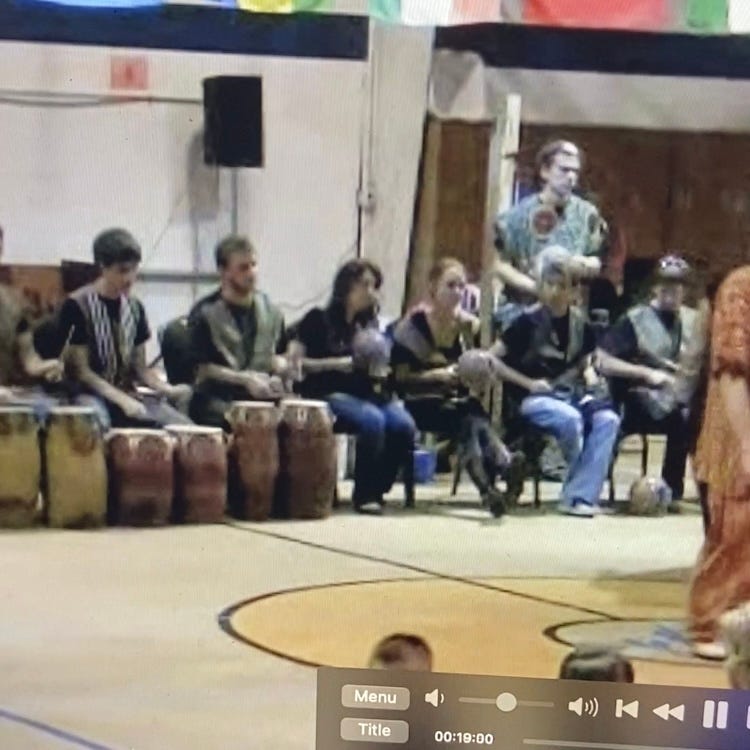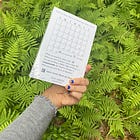Spring 2011 I signed up for African Percussion Ensemble. It’s on my mind because we performed at a local school in Denton the same weekend my mom was in town and she filmed it, and I found all the DVDs of my college performances today. The first day of class, we sat in a circle and took turns on the different drums, passing them on to the next person — except — after the second or third pass, our teacher Gideon Alorwoyie, a high priest of Ghana, stopped me and put the shaker in my hand. Class carried on. One of the drummers asked him why I was no longer receiving the drums. Gideon looked at me and smiled, “She is Master Shaker.” It was his kind way of saying I did not have the coordination or skill to play the other drums. I spent the entire semester mastering the “da-n-da-da-n-da-n-da-da” shaker pattern. It was the first time in my life I ever played in a music ensemble without singing. In our premiere public performance together at the Dallas Modern Art Museum, I felt the shaker pattern lock in with the drum beside me, and I felt a thrilling synergy, and I realized, oh — this is the high instrumentalists get.
I came to instruments as an adult in jazz college. My parents are both music lovers, and my mom sings, but they were not “Musicians”, so my household didn’t have instruments beyond a recorder and toy xylophone when I was growing up (minus a keyboard in my last half of high school). Singing I was naturally good at and loved passionately, so voice lessons, talent shows, choir, show choir, musical theater, sheet music and karaoke tapes were an easy yes. My one chance for a guitar was knocked out by a group guitar lesson put on by a neighbor (a hobbiest), and the guitar we borrowed from a friend was a full sized adult guitar — HUGE on my child’s body. The neighbor spent the lesson teaching the boy, ignored me, and I walked away incredibly frustrated, disappointed and believing that my hands just couldn’t play the guitar.
In the stack of DVDs, there was a recording of my Fall 2010 vocal jazz forum, six months before African Percussion Ensemble. Vocal Forum performances were a bi-yearly “torturous but fun” experience of putting together a 4-5 song set (fun) and performing it in an up close, intimate setting for the 20+ competitive singers in the jazz department (torture). It’s exciting to see yourself on film, and I wore a really great dress — and then I watched myself bring out the guitar and held my breath. It is a recording of the first time I ever played guitar, let alone any instrument, in public or in a performance. It was a last minute addition to the set and a pretty bold choice to open the performance with it. My dad helped me buy my first guitar a few months earlier, a Seagull, and the guitar was a revelation. But in its debut performance, I played terribly. I cannot emphasize enough that I never had played an instrument in public before — ever, and I greatly underestimated how sweaty my hands would get and how to balance singing into a microphone while playing. I was not prepared. I had a few guitar lessons from a friend earlier that summer, we even tried out a few of my songs as a band, but I did not have the necessary consistent guitar lessons to prepare me to play an instrument solo. And I didn’t just accompany myself while I sang a song, I played a song I wrote, and I was going through a bluesy-kitsch phase and it was objectively an embarrassing song.
I had to take a moment after watching to process my feelings before I could come back to the DVD. There was a small part of me watching that felt like the world was ending, but the set recovered and I recovered. By the third jazz song, a jazz standard, my performance was tight and my swing feel was in the pocket. I wrote a really cool, high energy arrangement of Alright Okay You Win for the fourth song that won the audience over, and by the fifth song, a beautiful cover of Maria Rita’s Despedida, I was touched by the bravery and audacity I had. I took huge risks to play a song I wrote on guitar at the beginning of the set, to try out a cool arrangement, and to play the Maria Rita tune with an acapella section. I was in the trenches! I was learning! I got up in front of really critical people and tried something — yes, it failed — but I got what I wanted: to play a song I wrote on the guitar for the first time in public, not later, but RIGHT THEN. And in rewatching it as a stranger to myself, 14 years later, I felt so much admiration for whoever that singer was who just got up there and tried things and didn’t appear to GAF (I most definitely did GAF). I grew from that. I practiced. I wrote more songs.
Failing on stage is so human and is a part of learning. It wasn’t until I saw a well known Brooklyn indie musician I admired play one of the most unbearably cringe solo sets I’ve ever seen, learn from it and play a successful solo show a year later that it really put into perspective that one bad song, one bad audition, one bad show doesn’t define anyone — YOU ARE LEARNING — and it never erases our value. Safe teachers, audiences and communities are compassionate and forgiving. Internally sourced power knows your worth is never contingent on how well you sing or play an instrument.
4 Tips For Learning An Instrument As An Adult
1. Keep a compassionate star chart
The difference between a compassionate star chart and the traditional star chart is that you fill in stars on the days you practice and you fill in hearts on the days you miss. The pitfall of the traditional star chart is the blank space: when you do not fill in the star chart, ie - you miss a day and leave a blank space, many people break the habit of updating the star chart altogether and thus, stop keeping track of practicing. The star chart is a habit you must develop. When you fill in a heart — you are locating your chart and filling it in, no matter if you practiced or not. By updating your practice chart every day, you will practice more. Not in a hyper vigilant way, but in a way that comes about naturally and easy.
“When you forget to implement your new habit or behavior, it’s because your brain is working efficiently to try and save energy for more cognitively demanding tasks. It is reverting to what it knows best and what has previously been ingrained. It won’t take the path less travelled unless you are consistent.”
2. Accept and Lean Into The Cringe
You will be cringe. It is a part of the adult beginner’s journey. You have to see yourself like you would see a child and offer yourself the same kindness, safety, and compassion. Let go of your expectations and take whatever steps you need to take — and do it NOW. Cringe moments are only moments. They do not define you. It is brave and fearless to be cringe.
3. Find a compassionate teacher who knows how to teach beginners, cheers for your wins and can teach you to practice efficiently
The gift of learning instruments as an adult is that it made me a better teacher.
Science proves that the best teachers for beginners are the ones who can remember how it feels to be a beginner. I had so much natural patience for my students and for students I inherited, who’s previous teachers would get frustrated, because I knew what it was like.
Does your teacher know how to teach beginners? If you find yourself frequently frustrated, lost, overwhelmed or even embarrassed by your private lesson teacher — they may be too advanced or too critical of a musician to remember how to teach beginners. My very first lessons were with someone who was kind and compassionate towards beginners, and that was incredibly important. I would not advise a beginner to study with a dazzling talented freshly graduated masters student seeking perfection. I would advise them find a teacher who has established success with beginner students.
4. Surround yourself with community that supports you
It was really psychologically tough to be a beginner in front of collegiate jazz musicians. I was fortunate to have friends who supported my first attempts. Things really changed for me when I moved to Brooklyn and I found more forgiving communities, teachers and audiences who supported and celebrated my wins AND my learning. We all grow so much faster from encouragement and celebration, rather than from toxic competition, fear and shame.
My students are successful because I truly believe in them.
I want to close out this thought-train with a song shared with me on the drive to the first African Percussion Ensemble gig in 2011. The gigs were all over DFW - the first was at Dallas’s Modern Art Museum, so I carpooled with an acquaintance who became a friend when we hit bad Dallas traffic. He asked me what I kind of music I wanted to listen to, and I said anything interesting, and he played Jonathon Richman. First “Ice Cream Man”, followed by “Morning of Our Lives” — which I think is the perfect song-antidote for anyone afraid to play music for fear of sounding cringe.
YOUR TIME IS RIGHT NOW.







such a great reminder to embrace the cringe and then move past it